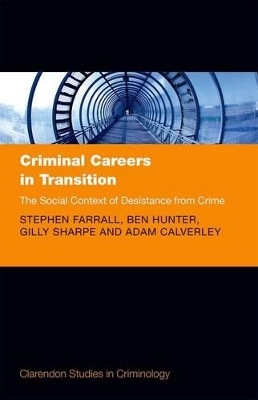
Criminal Careers in Transition
Oxford University Press (Verlag)
978-0-19-968215-7 (ISBN)
Continuing previous work exploring why people stop offending, and the processes by which they are rehabilitated in the community, Criminal Careers in Transition: The Social Context of Desistance from Crime follows the completion of a fifth sweep of interviews with members of a cohort of former probationers interviewed since the late-1990s. The research undertaken since the inception of the project in 1996 has focused on developing a long-term evidence base, rather than a rapid assessment, examining whether (and how) probation supervision assists desistance from crime.
Building on interviews from previous sweeps, the authors continue their exploration into the needs identified by probation officers and probationers, the extent to which these have been successfully met over the medium to long-term, and whether this suggests that probation helps probationers to desist. The authors argue that probation supervision did indeed help the probationers, but that this had taken a long time to 'bear fruit' and was related to other social and personal changes. There is discussion of a number of key topics, including sample members' continued social and personal development (including the impact of parenthood on them) and their motivation to change and maintain a law-abiding lifestyle, as well as their experiences of dealing with the stigma of a criminal record and the long-term process of 'remaking' themselves. This core empirical research and analysis is framed by a comprehensive review of not only the contemporary literature on desistance and reoffending, but also what constitutes a successful and effective research design in this field.
Whilst there have been several attempts to develop theories of desistance, few have attempted to understand and theorise the long-term impacts of probation supervision. Criminal Careers in Transition addresses this by building an account of the processes which help to shape the speed, nature, and direction of an individual's efforts to avoid further offending and, thus, develop a theory of assisted desistance. The book continues the authors' exploration of the emotional trajectories of crime, victimisation, and desistance and the role of citizenship values in pathways out of crime, as well as original research into the spatial dynamics of desistance.
Professor Stephen Farrall is Professor of Criminology in the School of Law at Sheffield University. Criminal Careers in Transition represents the third book in a series of his publications, which have charted the processes associated with desistance from crime for a cohort of ex-probationers, joining previous books: Rethinking What Works With Offenders (Willan, 2002) and Understanding Desistance From Crime (Open University Press, 2006). His more recent research focuses on the long-term effects of Thatcherite social and economic policies on crime, and is funded by the Economic and Social Research Council. Dr Gilly Sharpe is a Lecturer in Criminology in the School of Law at the University of Sheffield. Gilly's research interests converge on the impact of state intervention on poor, marginalised and vulnerable groups. Previous publications have examined criminalised young women (Offending Girls: Young Women and Youth Justice, Routledge, 2012), the support and supervision of women lawbreakers, including ex-prisoners and their children, and persistent young offenders. Gilly's current research focuses on transitions into adulthood amongst women criminalised as children. Prior to entering academia, Gilly was a practitioner in youth justice and the voluntary sector. Dr Ben Hunter is a Senior Lecturer in Criminology, in the School of Law at the University of Greenwich. His research interests include desistance from crime, white-collar crime and the contributions existential philosophy can make to understanding offenders' lives. His research combined these interests to assess the accounts of white-collar offenders who resettled following conviction and punishment. Dr Adam Calverley is a Lecturer in Criminology in the School of Social Sciences at the University of Hull. This book marks a continuation of his involvement in this project, having been researcher and co-author of the previous book in this series Understanding Desistance from Crime. His research interests include ethnicity, crime and criminal justice and life after punishment and publications include the Home Office Research Study, Black and Asian Offenders on Probation and the research monograph Cultures of Desistance (Routledge) - the first investigative study to examine processes of processes of desistance among minority ethnic offenders.
PART ONE: WHAT WE DID, HOW WE DID IT, AND WHY WE DID THAT WAY ; 1. Critically Reviewing What We Know about Why People Stop Offending ; 2. Integrating Structural and Individual-Level Processes in Criminal Careers Research ; 3. The Mechanics of Studying Desistance from Crime: An Exemplar of a Qualitative Longitudinal Research Project ; PART TWO: WHAT WE DISCOVERED ; 4. The Offending Trajectories of Sample Members ; 5. The Long-Term Impacts of Probation Supervision ; 6. The Spatial Dynamics of Desistance ; 7. The Emotional Trajectory of Desistance ; 8. "I'm done with it all": Is Victimisation a Catalyst for Desistance? ; 9. Citizenship Values and Desistance from Crime: Exploring Change Over Time ; PART THREE: WHAT IT MEANS ; 10. Conclusion
| Erscheint lt. Verlag | 7.8.2014 |
|---|---|
| Reihe/Serie | Clarendon Studies in Criminology |
| Verlagsort | Oxford |
| Sprache | englisch |
| Maße | 157 x 222 mm |
| Gewicht | 548 g |
| Themenwelt | Recht / Steuern ► EU / Internationales Recht |
| Recht / Steuern ► Strafrecht ► Kriminologie | |
| Recht / Steuern ► Strafrecht ► Strafverfahrensrecht | |
| Sozialwissenschaften ► Soziologie | |
| ISBN-10 | 0-19-968215-1 / 0199682151 |
| ISBN-13 | 978-0-19-968215-7 / 9780199682157 |
| Zustand | Neuware |
| Haben Sie eine Frage zum Produkt? |
aus dem Bereich


